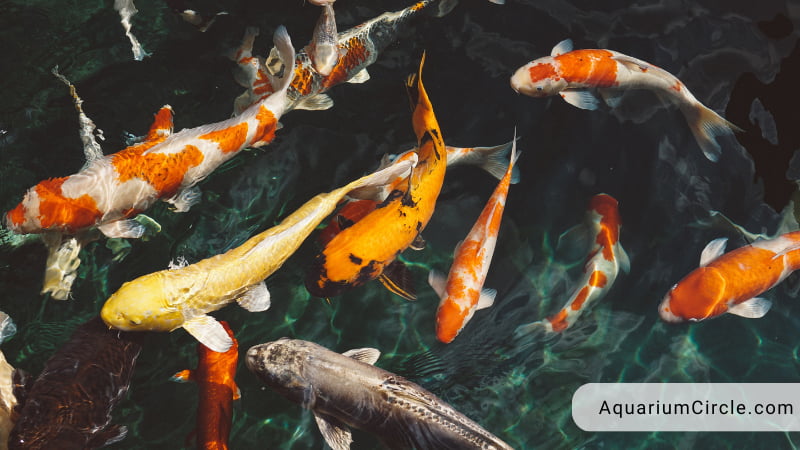Koi fish are a popular and fascinating addition to backyard ponds and water gardens. These colorful and graceful fish are known for their longevity and can live for many years with proper care and maintenance. But, how long do koi fish live exactly?
In fact, koi fish are known to live for more than 20-30 years, with some koi fish even reaching ages of 50 years or more. The lifespan of koi fish can be affected by various factors, including genetics, water quality, temperature, diet, and environment. In this article, we will explore how these factors can affect the lifespan of koi fish and provide tips on how to extend the lifespan of these beloved aquatic pets.
See also:
- Betta Fish Lifespan – How Long Do Betta Fish Live?
- How Long Do Clownfish Live ? Top 4 Common Diseases Of Them
- What Is Peppermint Shrimp Lifespan? – Ultimate Care Guide
How Long Do Koi Fish Live? (Koi Lifespan)
Koi fish are known for their long lifespan and can live for several decades with proper care and maintenance. The average lifespan of a koi fish is around 25-35 years, but some have been known to live up to 50 years or more. However, the lifespan of a koi fish can vary depending on various factors such as genetics, environment, diet, and water quality… that will be disscuss the next part.
7 Factors That Affect The Lifespan Of Koi Fish
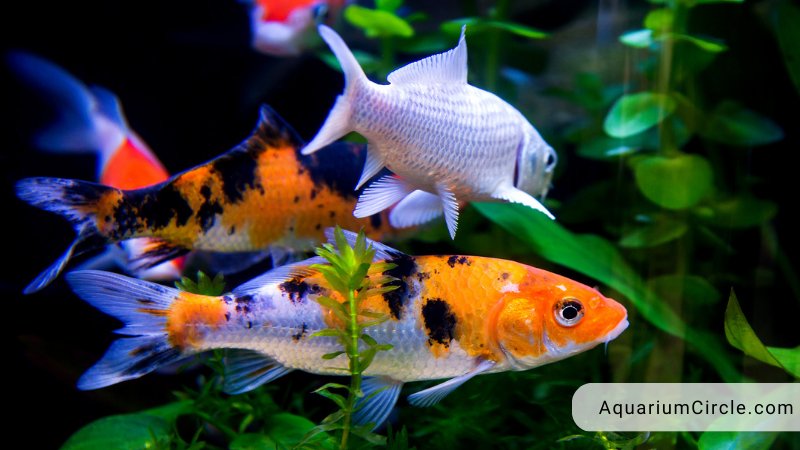
Now let’s go through 7 factors that have effect on the lifespan of koi fish, shall we?
Genetics
Genetics play an important role in determining how long do koi fish live. Some koi fish are genetically predisposed to living longer than others due to factors such as their lineage, breeding, and genetics. This means that some koi fish may have a genetic advantage when it comes to living a long and healthy life.
For example, koi fish that come from a lineage of long-lived fish are more likely to live longer themselves. Breeding practices also play a role in determining the lifespan of koi fish. Breeding fish with strong genetics and good health can help to produce offspring with a better chance of living a long and healthy life.
In addition, genetics can affect the immune system of koi fish. Some koi fish may have a stronger immune system than others, making them more resilient to diseases and infections. This can help them to live longer and stay healthier throughout their lifespan.
Water quality and temperature
Water quality and temperature are crucial factors that affect the lifespan of koi fish. Koi fish require a stable water environment with good quality and consistent temperature to thrive.
Poor water quality can be harmful to koi fish, causing stress, illness, and disease. High levels of toxins, ammonia, nitrite, and nitrate can be toxic to fish and cause health problems, leading to a shorter lifespan. Therefore, it is important to maintain proper water chemistry and perform regular water changes to keep the water clean and healthy for the fish.
Temperature is also a significant factor that can affect the lifespan of koi fish. Koi fish are cold-blooded, and their metabolism and overall health are affected by changes in water temperature. Extreme temperatures, whether too hot or too cold, can cause stress and harm to koi fish, leading to a shorter lifespan.
The ideal temperature range for koi fish is between 65-75°F (18-24°C), with a maximum fluctuation of 2-3°F (1-1.5°C) per day. Maintaining a consistent temperature in the pond and ensuring that the water is not too hot or too cold can help to extend the lifespan of koi fish.
Oxygen levels
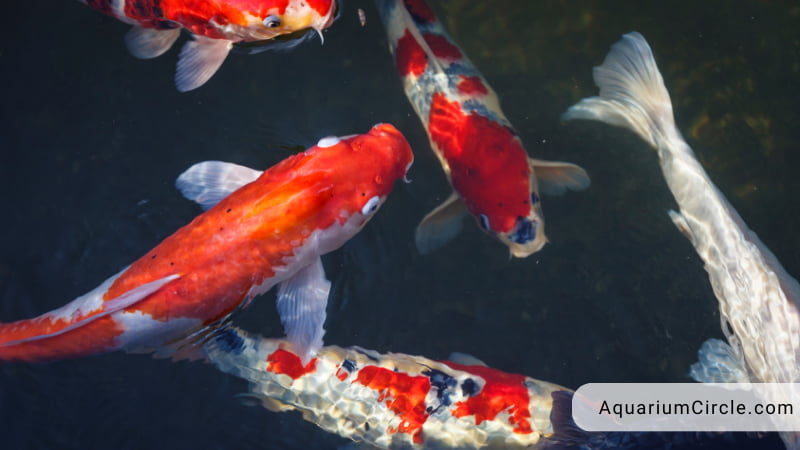
Oxygen levels are essential for the survival and wellbeing of koi fish, and they can significantly impact their lifespan. Koi fish require adequate oxygen levels in the water to breathe, metabolize food, and maintain their overall health.
Low oxygen levels, also known as hypoxia, can be harmful to koi fish and lead to a shorter lifespan. Hypoxia can cause stress, weaken the immune system, and make fish more susceptible to disease and infection. In severe cases, it can even lead to death.
High oxygen levels can also be harmful to koi fish, causing oxidative stress and damage to their cells and tissues. Therefore, it is essential to maintain the right balance of oxygen in the water to ensure the well-being and longevity of koi fish.
Aeration and water circulation are effective ways to maintain oxygen levels in the pond. Pond owners can use air pumps, diffusers, and waterfalls to increase oxygen levels and improve circulation. They can also reduce overcrowding in the pond, remove debris and organic matter, and avoid overfeeding to prevent oxygen depletion.
PH level
The pH level of the water can significantly affect the lifespan of koi fish. pH is a measure of the water’s acidity or alkalinity, and it is an essential factor that affects the health and well-being of koi fish.
Koi fish require a pH level between 7.0 to 8.5 for optimal health. A pH level outside of this range can cause stress and health problems, leading to a shorter lifespan. If the pH level is too low, the water is too acidic, and it can irritate the gills and skin of the fish, leading to respiratory problems and other health issues. If the pH level is too high, the water is too alkaline, and it can cause damage to the fish’s eyes, gills, and skin, leading to health problems and a shorter lifespan.
In addition, fluctuations in pH levels can also be harmful to koi fish. Rapid changes in pH levels can cause stress and harm to the fish, leading to health problems and a shorter lifespan. Therefore, it is essential to monitor the pH level of the water regularly and maintain a stable pH level within the optimal range.
Environment

The environment in which koi fish live can significantly affect their lifespan. Koi fish require a suitable environment to thrive and live a long and healthy life. The following factors are crucial in creating the right environment for koi fish:
- Pond Size: Koi fish require a large pond that is at least 1000 gallons in size to accommodate their growth and provide adequate space for swimming. Overcrowding can cause stress and health problems, leading to a shorter lifespan.
- Filtration: Proper filtration is essential to maintain the water quality in the pond. A good filtration system can remove toxins, ammonia, nitrite, and nitrate from the water, ensuring that the water is clean and healthy for the fish.
- Water Quality: Koi fish require clean, well-oxygenated, and toxin-free water to thrive. Poor water quality can lead to stress, disease, and other health problems, leading to a shorter lifespan.
- Sunlight: Koi fish require sunlight to produce vitamin D and promote growth and well-being. However, excessive exposure to sunlight can cause stress and harm to the fish, leading to health problems and a shorter lifespan.
- Plants and Décor: Plants and décor can provide hiding places and shelter for koi fish, reducing stress and promoting their overall well-being.
See also: Do Koi Fish Sleep? – Some Amazing Mysteries About Koi Sleep
Diet and nutrition
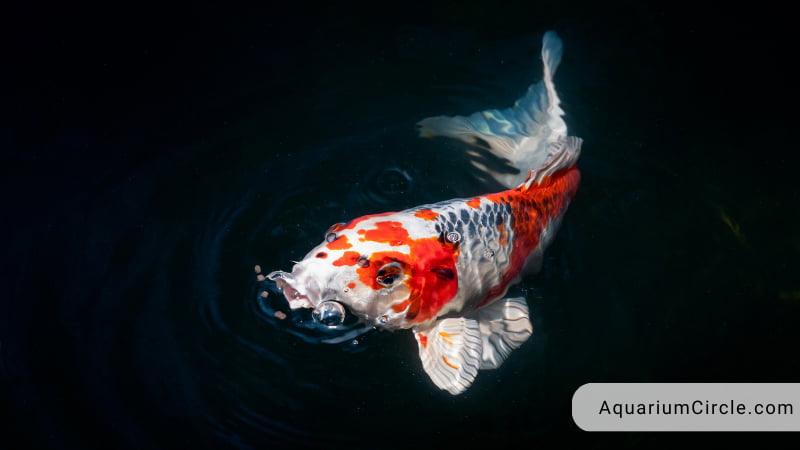
Diet and nutrition are essential factors that can significantly affect the lifespan of koi fish. Koi fish require a balanced and nutritious diet to maintain their health and well-being, and improper nutrition can lead to a shorter lifespan.
A balanced diet for koi fish should contain a high protein content, vitamins, and minerals to support their immune system, growth, and overall health. A diet lacking in protein or essential nutrients can lead to malnutrition, stunted growth, and other health problems, leading to a shorter lifespan.
Overfeeding can also be harmful to koi fish and lead to obesity, digestive problems, and other health issues, which can affect their lifespan. Pond owners should feed their koi fish in small portions, several times a day, and avoid overfeeding them.
The type of food given to koi fish can also affect their lifespan. High-quality commercial fish food formulated specifically for koi fish is recommended. These foods contain all the essential nutrients, vitamins, and minerals required for the fish to thrive.
Additionally, koi fish are opportunistic feeders and will eat anything that is available, including insects, plants, and even other fish. Pond owners should ensure that the pond is free of toxins and harmful chemicals, which can affect the quality of the food and the health of the fish.
Wintering
Wintering can significantly affect the lifespan of koi fish. Koi fish are cold-blooded and require a stable water temperature to maintain their health and well-being. Wintering refers to the process of preparing the pond and koi fish for the cold winter months to ensure that the fish can survive and remain healthy during this time.
During the winter months, the water temperature can drop significantly, which can cause stress and harm to koi fish, leading to health problems and a shorter lifespan. Therefore, it is essential to winterize the pond and provide proper care for koi fish during this time.
Signs Of An Aging Or Sick Koi Fish
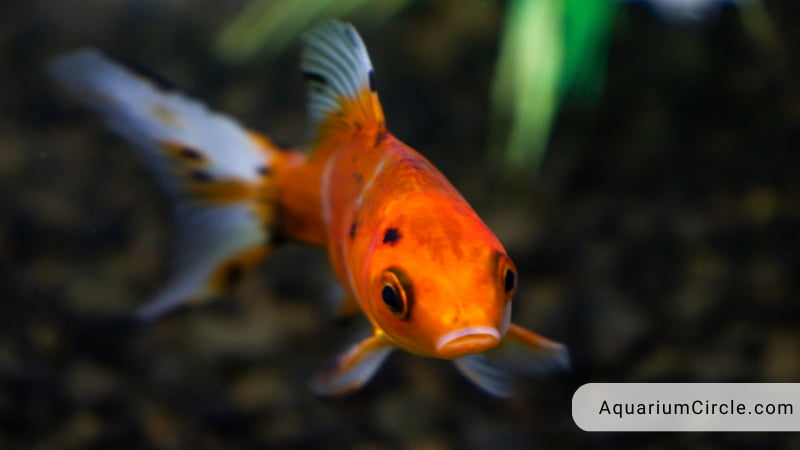
As koi fish age, they may start to exhibit signs of aging or illness. Here are some common signs of an aging or sick koi fish:
- Loss of Appetite: Koi fish that are aging or sick may lose their appetite or refuse to eat.
- Reduced Activity: Aging or sick koi fish may become less active and spend more time resting at the bottom of the pond.
- Slow or Labored Movement: Koi fish that are aging or sick may move slower or have difficulty swimming.
- Decreased Vibrancy: Aging koi fish may start to lose their vibrant coloration and become paler or duller in appearance.
- Sores or Lesions: Sick koi fish may develop sores or lesions on their body or fins.
- Erratic Swimming: Koi fish that are sick may swim erratically or in circles.
- Gasping for Air: Koi fish that are not receiving adequate oxygen may gasp for air at the surface of the pond.
- Fin Rot: Fin rot is a common bacterial infection that can affect koi fish, causing their fins to become frayed or eroded.
- Bulging or Sunken Eyes: Koi fish that are sick may develop bulging or sunken eyes, which can indicate an underlying health problem.
- Excessive Mucus: Sick koi fish may produce excessive mucus on their body, which can indicate an infection or other health problem.
Monitoring the health and behavior of koi fish regularly can help pond owners identify any signs of aging or illness early and take appropriate measures to ensure their well-being. Sick or aging koi fish may require specialized care, medication, or veterinary attention to help them recover and maintain their longevity.
What Can You Do To Make Your Koi Fish Live Longer?
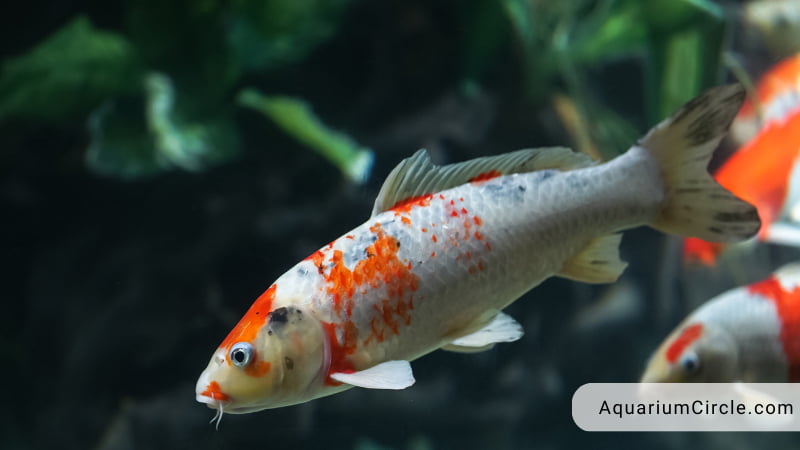
Koi fish can live for several decades with proper care and maintenance. Here are some tips to extend the lifespan of koi fish:
- Provide a Suitable Environment: Koi fish require a suitable environment to thrive, including a large pond, proper filtration, good water quality, stable water temperature, and appropriate sunlight exposure. Maintaining a suitable environment can help to prevent stress, disease, and other health problems, leading to a longer lifespan.
- Maintain a Balanced Diet: Koi fish require a balanced and nutritious diet to maintain their health and well-being. Providing high-quality fish food, avoiding overfeeding, and ensuring that the pond is free of harmful substances can help to ensure that the koi fish receives the proper nutrition needed to live a long and healthy life.
- Monitor Water Quality: Regularly monitoring the water quality in the pond and performing water changes as necessary can help to prevent toxic buildup and ensure that the water remains clean and healthy for the koi fish.
- Provide Adequate Aeration: Providing adequate aeration in the pond can help to maintain oxygen levels in the water and prevent stress, disease, and other health problems, leading to a longer lifespan.
- Regularly Check for Signs of Illness: Regularly checking the koi fish for signs of illness or stress can help to identify any health problems early and take appropriate measures to ensure their well-being.
- Winterize the Pond: Winterizing the pond and providing proper care for koi fish during the winter months can help to ensure that the fish survive and remain healthy during this time, leading to a longer lifespan.
In conclusion, by providing proper care and maintenance, pond owners can help extend the lifespan of koi fish and enjoy their beauty and companionship for many years to come.
Video About How Long Do Koi Fish Live
FAQs
Can koi fish live up to 200 years?
No, koi fish cannot live up to 200 years. While they are known for their longevity and can live for several decades with proper care, the oldest recorded koi fish was around 226 years old, but that is considered an exceptional case, and most koi fish have a lifespan of 25-35 years.
How long do koi fish live in a pond?
Koi fish can live up to 25-35 years in a pond with proper care, maintenance, and the right environment.
Are koi fish hard to keep alive?
Koi fish are not necessarily hard to keep alive, but they do require proper care, maintenance, and the right environment to thrive. With the right setup, diet, and regular attention, koi fish can live a long and healthy life.
Why do koi fish live so long?
Koi fish can live so long due to a combination of genetic factors, proper nutrition, and the right environment. They also have a slow metabolism, which contributes to their longevity. Additionally, koi fish have a resilient immune system and can adapt to changes in their surroundings, which helps them to survive for a long time.
References

Annette M. Chaney is an experienced marine biologist with over 20 years of experience as an aquarist and fishkeeper. She started her first aquarium at a young age, filling it with frogs and goldfish obtained from the ten-cent pet store.
Annette grew up caring for and breeding African Cichlids, which led to a hobby in high school that doubled as a profitable means. Attending Reed College gave her time to solidify herself as an accomplished aquarium caretaker with an eye for sales. After that, from 2009 – 2013, she studied at Roger Williams University – one of the most prestigious universities for Aquaculture and Aquarium in USA. She is the founder of AquariumCircle since 2010.
